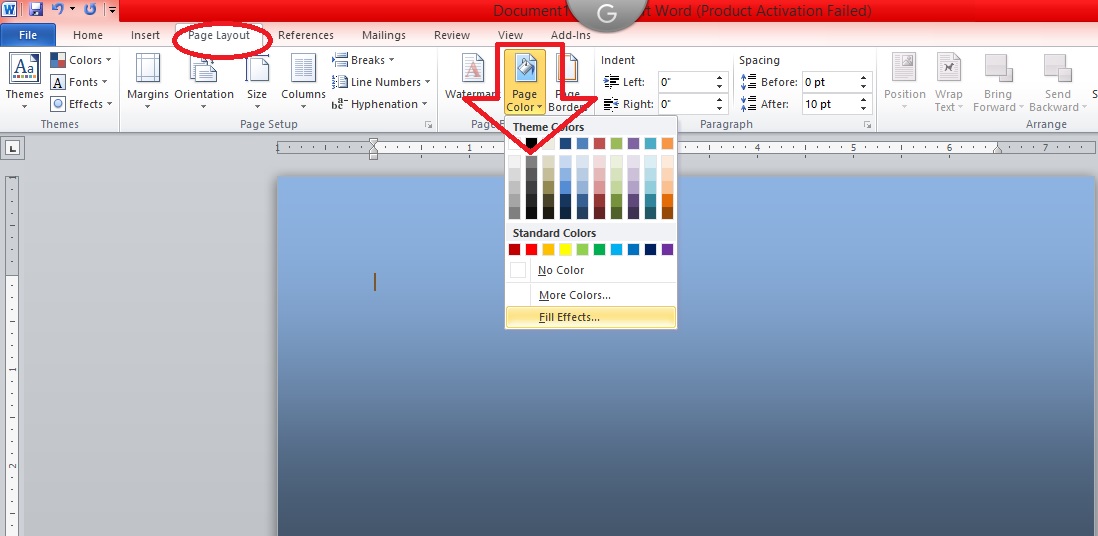
- #How to change microsoft word background color in columns how to#
- #How to change microsoft word background color in columns code#
- #How to change microsoft word background color in columns windows#
You can also create a class module so you don't have to create all those Change events, but that's beyond the scope of this answer. You can also change the background for your Office apps, and apply a new pattern. As I type this reply, the background is black with white characters.

I very carefully click on OK when I make the changes so I know that is not the problem. Click on it and choose the theme that you want: Black, Dark Gray, Colorful, or White. No matter what I select, White, Gray, or Colors, the background remains black. Private Sub ChangeCellBg(ByVal sValue As String, ByVal lRow As Long) Go to the General section on the left, and then look for the Office Theme drop-down list. If you're using ActiveX controls, you can do something like this Private Sub ComboBox1_Change() ThisDocument.Protect wdAllowOnlyFormFields, True This change applies to every window on your computer.
#How to change microsoft word background color in columns windows#
Windows changes the background color in all windows to the color you specified. Click Desktop Background found at the bottom of the dialog box. Select Case Selection.FormFields(1).Result Click Change the Theme located in the Appearance and Personalization group. You'll have to complete the macro for all the options. If you're using legacy dropdowns as form fields, you can put this sub as the Exit Macro. Private Sub Document_ContentControlOnExit(ByVal ContentControl As ContentControl, Cancel As Boolean)Ĭ(1).Shading.BackgroundPatternColorIndex = wdGreenĬ(1).Shading.BackgroundPatternColorIndex = wdRedĬ(1).Shading.BackgroundPatternColorIndex = wdYellowĬ(1).Shading.BackgroundPatternColorIndex = wdGray50
#How to change microsoft word background color in columns code#
This code goes in the ThisDocument module. When the user moves out of the cell, it's formatted based on what was selected. For a more vibrant picture, clear the Washout check box and click OK.You could use the Exit event of the ContentControl.Click the Scale arrow, and choose how big or small you want the watermark picture to appear in the document.In the Insert Picture dialog box, navigate to the folder where the picture you want to use is stored, and double-click.In the Printed Watermark dialog box, select the Picture watermark option, and then click Select Picture.On the Page Layout tab, in the Page Background group, click the Watermark button, and then click Custom Watermark.

In the tool ribbon at the top of Microsoft Word, find the Design tab and locate Page Color.
#How to change microsoft word background color in columns how to#
Here is how to add a graphic watermark to every page of a document: How to Really Use Microsoft Word’s Dark Mode. Now go to condition backgroubd formating (click on field column in which you want to do background formatting) Now in the conditional background formating use the new column to make the rules. When you want to dress up the pages of your document without distracting attention from the main text, you might considerĪdding a graphic watermark. just make a new column with similar concept as explained below ( you have to apply either if or switch function) :. The document displays the texture and watermark you specified. Then in the Zoom dialog box, click Whole Page, and click OK.

There might be times when you want words or a graphic to appear behind the text of a printed or online document. Whether you are creating a document that will be printed, viewed on a computer, or published on the Internet and viewed inĪ Web browser, you can make your document stand out by adding a background color or pattern.


 0 kommentar(er)
0 kommentar(er)
